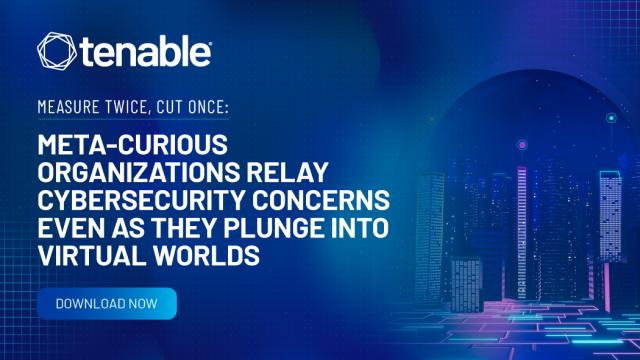- I found a Bluetooth tracker for Android users that works better than AirTags (and is cheaper)
- Learn with Cisco at Cisco Live 2025 in San Diego
- This Eufy robot vacuum has a built-in handheld vac - and just hit its lowest price
- I highly recommend this Lenovo laptop, and it's nearly 50% off
- Disney+ and Hulu now offer prizes, freebies, and other perks to keep you subscribed
Tenable Study Reveals Australia Leads Global Race To Invest In The Metaverse Despite Security Concerns

- 64% of Australian businesses planning to invest in the metaverse within 12 months versus 56% in the United States and 55% in the United Kingdom
- Cybersecurity the top factor affecting organisations’ commitment to operate in the metaverse, even ahead of macroeconomic concerns
A new study published today by Tenable®, the Exposure Management company, has found that 64% of Australian businesses are planning to invest in the metaverse in the next six to 12 months, while 56% of U.S. businesses and 55% of U.K. businesses are expected to do so in the same time frame.
However, as with most things in business, opportunities are not without risk or consequences. Almost half of the respondents (44%) said managing cybersecurity risk, while 38% said managing privacy and the collection of information, were the biggest threats to their organisations when considering investing in the metaverse.
The study, “Measure Twice, Cut Once: Meta-curious Organisations Relay Security Concerns Even as They Plunge Into Virtual Worlds,” surveyed 1,500 IT, cybersecurity and DevOps professionals in Australia, the U.K. and U.S. The study examines how organisations are approaching the opportunities and challenges associated with building, securing and participating in the metaverse, as well as offering insights into the risks and rewards of investing in this new technology.
While still in its relative infancy, organisations are already moving decisively into this space, which McKinsey & Company predicts will grow to $5 trillion by 2030. With a truly immersive experience in the metaverse requiring the collection, processing and disclosure of personal data, the study determined that 86% of organisations said they were very and somewhat comfortable collecting and sharing personal identification information (PII) with third-party services in the metaverse. However, when asked about the biggest barriers to entry for their own organisation, 35% cited the prospect of security breaches and identity theft.
Apart from the obvious traditional threats we see in the real world such as phishing, ransomware and compromised machine identities, ‘unknown unknowns’ is a real concern for businesses operating in the virtual realm. The study shows 83% of Australian respondents think that malicious cyber activity that’s possible in immersive virtual settings, such as ‘man in the room’ attacks, is very likely (37%) or somewhat likely (46%) to occur in the metaverse. The threat posed by deep fakes lurking in the metaverse is also at the forefront of many organisations’ minds. The survey revealed 81% of Australian respondents think it is very likely (39%) or somewhat likely (42%) that the cloning of voice, facial features and hijacking video recordings using avatars might occur in the metaverse.
“As with any new business opportunity, first movers have the advantage and the risk,” said Robert Huber, chief security officer and head of research, Tenable. “The foundation of the cybersecurity program must be solid before making a big leap into largely unknown territory and drastically expanding your attack surface. Forward- thinking organisations that take the time and make wise investments in their security personnel and the security and integrity of their infrastructure are more likely to be successful in the metaverse or any other technology investment.”
Another major factor that is causing trepidation in many organisations’ future plans for the metaverse is an economic one. With the Reserve Bank of Australia’s recent interest rate hike amid inflation fears, 35% of respondents stated that their organisations will wait to see how the macroeconomic conditions unfold before committing resources to an unknown venture.
While it’s clear that security experts are concerned about the metaverse and how it will be navigated, this hasn’t discouraged Australian businesses from taking the first steps into the virtual universe. Encouragingly, the survey indicates there is recognition that a proactive strategy to train, educate and encourage talent will be necessary to enable organisations to operate safely inside the metaverse.
More than half (53%) of Australian respondents say their organisation will need to invest in training their current employees about safe cybersecurity practices to support their investment in the metaverse. These organisations also acknowledge that hiring talent in specialised areas such as IT (52%), cybersecurity for the metaverse (49%) and software developers (47%) will be crucial.
To read the full study, visit: https://www.tenable.com/cyber-exposure/managing-risk-in-the-metaverse
Additional resources are available on the Tenable blog: https://www.tenable.com/blog/what-happens-when-the-metaverse-enters-your-attack-surface
Note to Editors:
- Opinion Matters conducted an online survey on behalf of Tenable of 1,500 professionals representing roles in cybersecurity, DevOps and IT engineering. The study was fielded in Australia (500 respondents), the U.K. (500 respondents) and the U.S. (500 respondents) in October and November 2022.
About Tenable
Tenable® is the Exposure Management company. Approximately 40,000 organizations around the globe rely on Tenable to understand and reduce cyber risk. As the creator of Nessus®, Tenable extended its expertise in vulnerabilities to deliver the world’s first platform to see and secure any digital asset on any computing platform. Tenable customers include approximately 60 percent of the Fortune 500, approximately 40 percent of the Global 2000, and large government agencies. Learn more at tenable.com.
Media Contact:
Tenable
[email protected]

